FORTHCOMING
PREVIOUS

Mud and Stars: Dickens’s Legal Symbolism in Hard Times, and the 1857 Matrimonial Causes Act
This lecture explores the legal symbolism of “mud” and “stars,” the two inextricably linked extremes in Charles Dickens’s tenth novel, Hard Times (1854). Although conventionally read as a critique of Victorian industrial society and its philosophy of utilitarianism, Hard Times also features legal themes and symbols, which implicitly comment on the major legal developments in mid-Victorian Britain. For example, the dying Stephen Blackpool gazes “at a star” in a muddy pit, comparing the legal conundrum of his life (his practical inability to divorce his wife) to a “muddle” (Book 3, ch. 6). Although neither “mud” nor “stars” features in any prominent scholarly work featuring key Dickensian terms, such as John Sutherland’s The Dickens Dictionary or Arthur L. Hayward’s The Dickens Encyclopedia, both terms represent significant images in the Dickensian vocabulary, and their deliberate juxtaposition in the novel outlines the novelist’s implicit criticism of Victorian divorce law in the years both leading up to and immediately following the Matrimonial Causes Act of 1857. Just like “mud,” this seminal British divorce law, which moved divorce from the Church to a new secular court, seemed to have impeded and complicated the delivery of justice, resolution and fairness in divorces, despite its goal of simplifying such legal process. Moreover, the contrast between “mud” and “stars” highlights the striking disconnect between the gloomy reality of many Victorian marriages versus the high yet unattainable ideals, which underpinned marriage law in nineteenth-century England.
Doctor Adrianne Wojcik teaches English literature in Northern Virginia, and supervises legal practice at the United States Department of Defense Education Activity. She holds a MA in English from Northwestern University and a PhD in Victorian literature from Marquette University, as well as law and opera degrees from Indiana University. Her research interests include intersections between British Victorian law, culture and literature. She has published in Journal of the Assembly for Expanded Perspectives on Learning, Dickens Quarterly, and The Dickensian.
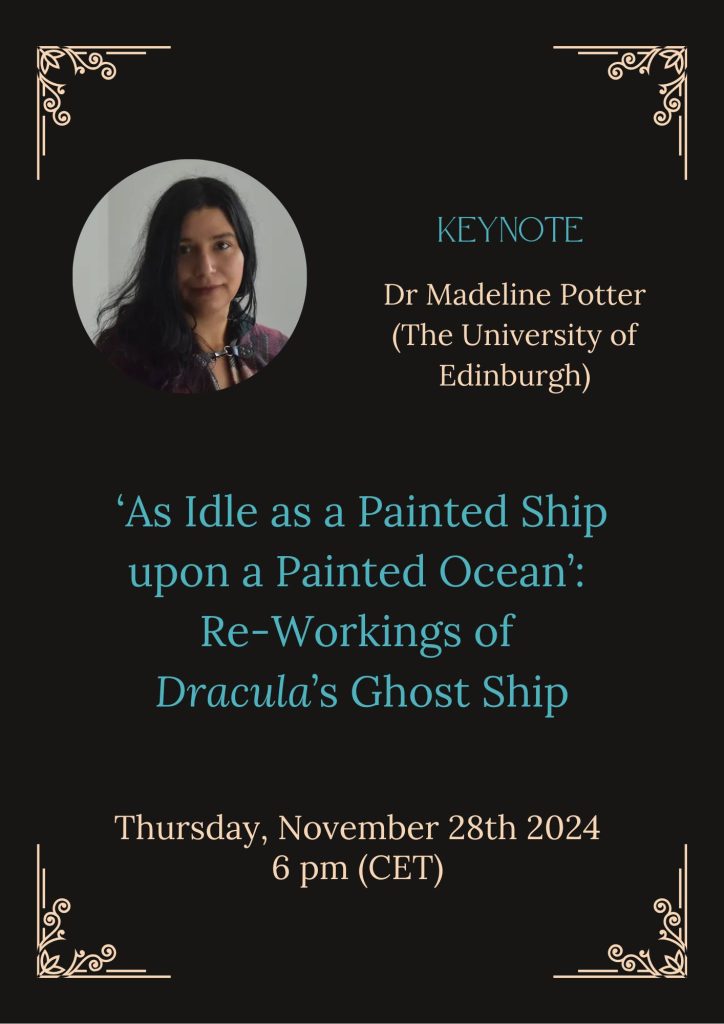
Warsaw Literary Meetings Rising Stars 3 keynote
November 28, 2024: Dr Madeline Potter, The University of Edinburgh
‘As Idle as a Painted Ship upon a Painted Ocean’: Re-Workings of Dracula’s Ghost Ship
When the Demeter drifts aimlessly into Whitby harbour, it bears onboard a dead captain, clutching a crucifix between his bloodied hands. But what is the significance of this in Dracula? Though brief, the Demeter episode in Bram Stoker’s Dracula draws together the novel’s Gothic themes; significantly, the tale pieces together intertextual references to Coleridge’s ‘Rime of the Ancient Mariner’, with a historical account of a shipwreck on the Yorkshire coast and biographical elements, making the scene a reworking of sorts, at whose heart sheer terror lies exposed. To what extent, then, do these anxious reworkings endure when the Demeter episode itself is reworked in adaptations of Dracula? Drawing on insights from recent critical interventions in the field of the ecoGothic and oceanic studies, and employing Ann Radcliffe’s distinction between terror and horror, I shall seek to assess this question with a focus on two adaptations of Stoker’s novel: F.W Murnau’s Nosferatu (1922), and André Øvredal’s The Last Voyage of the Demeter (2023). My talk will investigate how Stoker’s original — drawing on Coleridge — stages an epistemology of terror at sea through a focus on sensory perception, and explore how this is at play in the two adaptations.
WATCH or LISTEN TO the lecture (~ 40 min.) – please note that the Q&A is not included in the recording.
March 14, 2024: Dr Dorothea Flothow, University of Salzburg
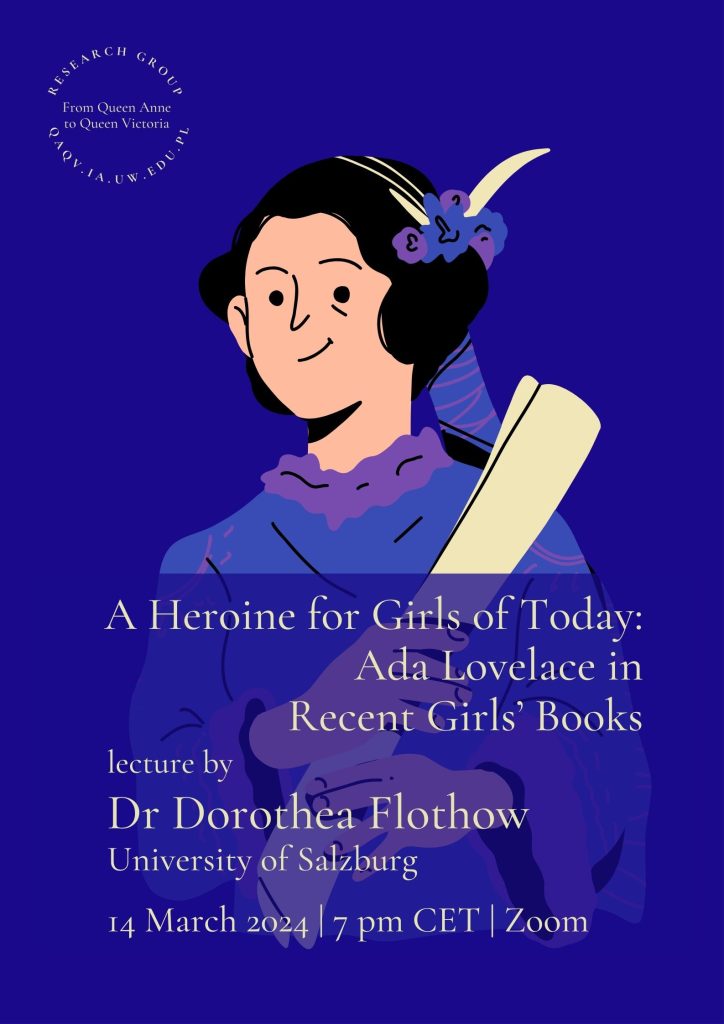
A Heroine for Girls of Today: Ada Lovelace in Recent Girls’ Books
In recent years, Ada, Countess of Lovelace (1815-1852), daughter of the notorious poet Lord Byron, has been resurrected as a feminist icon and STEM heroine. As a skilled mathematician and the ‘first computer programmer’, she is commemorated as a role model for today’s young women. Her achievements are commemorated on Ada Lovelace Day (see https://findingada.com/), she has a programming language and mentoring programmes named after her (https://ada-lovelace.de/).
More recently, her life has also been adapted to more than a dozen picture books and biographies for young girls, which will be examined in this talk.[1] These, likewise, create Ada as a STEM heroine who paved the way, overcoming great odds. She is presented as an intelligent, independent and seemingly very modern heroine, which the readers are clearly meant to emulate. While the girls’ books thus reveal the clear intention of fostering girls’ interest in science, and also create a very emancipated implied female reader, this talk will also argue that the life of Ada Lovelace as adapted for recent girls’ books is far from unproblematic. In fact, the texts examine overwhelmingly relying on traditional stereotypes, images and plot devices which undermine Ade Lovelace’s achievements for the sake of an easily-accessible story and glossy images. They thus suggest that where popular girls’ literature is concerned, re-writings of Victorian lives may still have some way to go.
[1] See e.g. Lethbridge, Ada Lovelace: Computer Wizard of Victorian England (2004); Robinson, Ada’s Ideas (2016); Chistianson, The Enchantress of Numbers: The Story of Ada Lovelace (STEM Super-heroines) (2017).
This lecture was not recorded.
December 7, 2023 | 19:00: Prof. Suzanne Schwarz, University of Worcester
Royal Attitudes to the Atlantic Slave Trade and Abolition in the Late Eighteenth and Early Nineteenth Centuries
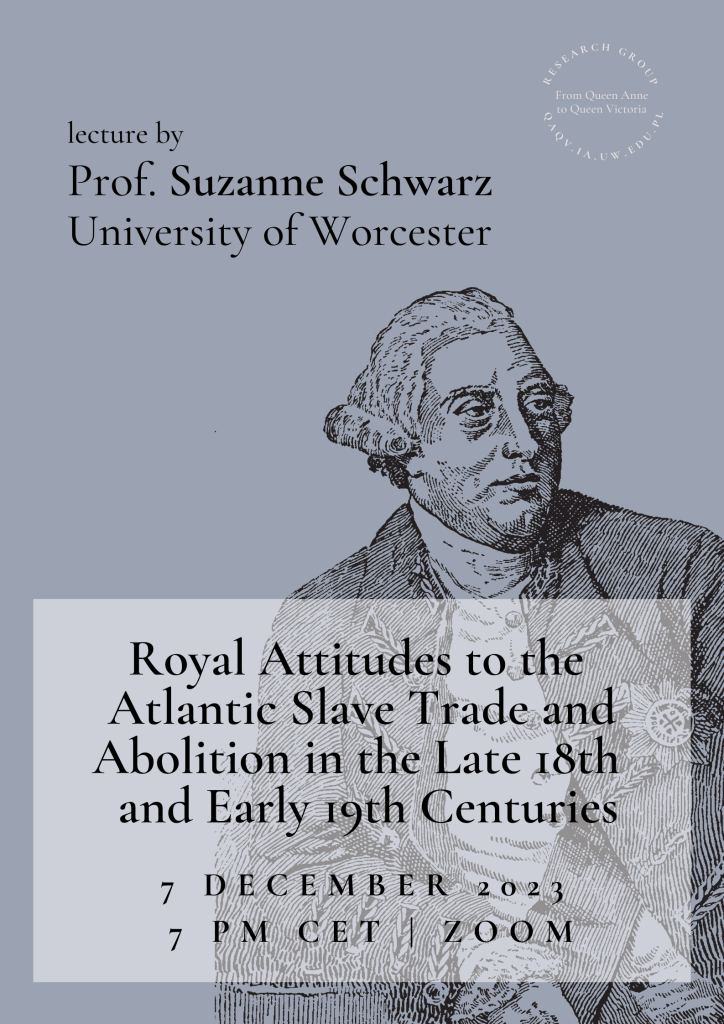
Recent historiography has placed particular emphasis on the social origins and influence of individuals who took opposing sides in debate on the abolition of the slave trade between 1787 and 1807. There is no doubt that family networks and connections influenced patterns of pro-slavery and abolitionist support. Despite this familial focus, comparatively little attention has been paid to the attitudes and interventions in debate of King George III and his family. As early as 1808, Thomas Clarkson’s History of the Rise, Progress, and Accomplishment of the Abolition of the African Slave-Trade by the British Parliament, recorded how Prince William Henry, duke of Clarence, and his younger cousin, Prince William Frederick, second duke of Gloucester and Edinburgh, held diametrically opposed views on the issue. Evidence that has recently come to light in the Royal Archives makes it possible to assess whether the divide between George III’s son and nephew points to a royal family riven by disagreement on the rights and wrongs of slavery. By broadening the canvas of study to include other royal dukes, the lecture contributes to a much fuller understanding of the family’s reaction to one of the most pressing moral and economic questions of the day. Their views were not just a matter of their own personal opinions; their interventions in debate affected (and on balance, impeded) the progress of abolition and had direct repercussions on the lives of hundreds of thousands of enslaved Africans.
This lecture was not recorded.
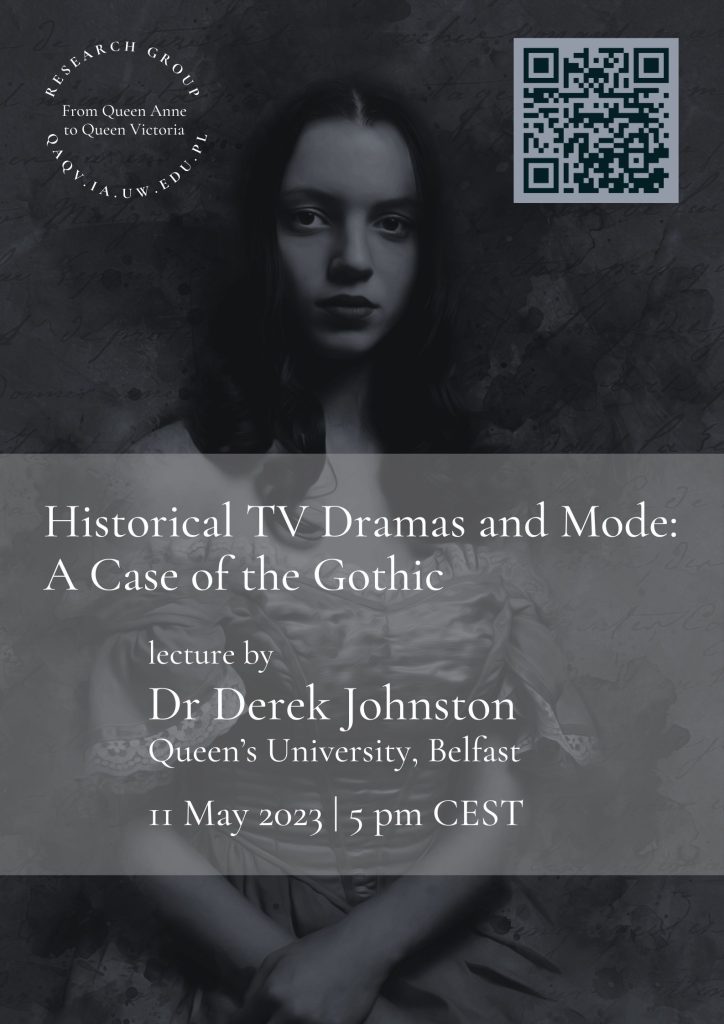
May 11, 2023: Dr Derek Johnston, Queen’s University Belfast
Historical TV Dramas and Mode: A Case of the Gothic
Historical dramas can be presented in many different ways in film and television, with the mode in which the genre of historical drama is presented influencing how that drama is understood. Thus, the same events portrayed in a comic mode will tend to be received differently than if presented in a tragic mode. Historical dramas take on many modes: heritage dramas, romances, swashbucklers, political thrillers, crime dramas, but this lecture will focus on the Gothic mode. The Gothic mode emphasises darkness and trauma in its aesthetics and narrative; the lecture will particularly concentrate on the ways that some of these Gothic historical TV dramas use a combination of style, anachronism and theme to emphasise how historical traumas remain relevant to and recur in the present. In doing so, they can destabilise ideas of national or cultural identity, and of dominant historical narratives, particularly challenging the structures of power such as capitalism, imperialism and sexism, and the way that historical narratives are constructed in order to support dominant histories and power structures.
LISTEN to the lecture (~ 40 min.) – please note that the Q&A is not included in the recording.
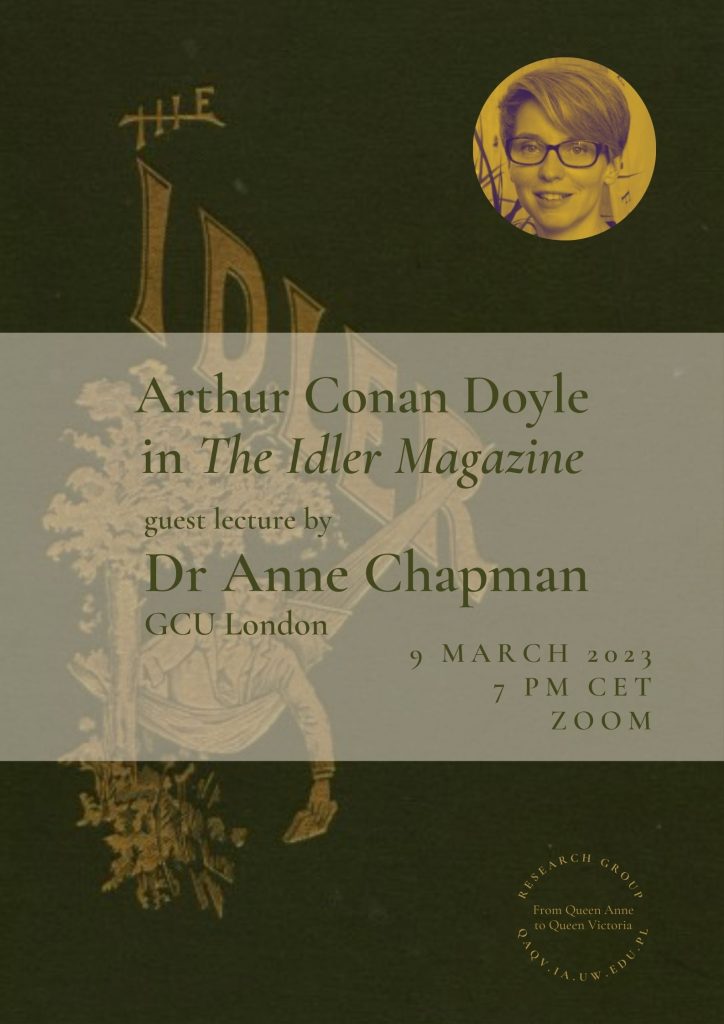
9 March 2023: Dr Anne Chapman, GCU London
In this talk Dr Anne Chapman discusses Arthur Conan Doyle’s exploration of authority in the popular illustrated monthly magazine The Idler. It first explores the ways in which he contrasts expertise and authority in the short stories he wrote for the periodical. It then turns to demonstrate how these stories inflect his presentation of himself. Doyle’s contributions to the periodical included the 1892 article, ‘The Glamour of the Arctic’, which draws on his experience as a ship’s surgeon aboard the Arctic whaling ship Hope, and, in 1893, a reflective piece in the series, ‘My First Book’, which describes his literary development from an early age. These pieces suggest how he wished the public to see him as he positions himself amongst the crew of the whaling ship and as he confers authority upon himself as a writer. In considering the periodical publishing context, this talk will also discuss the ways in which The Idler’s illustrations contribute our reading of Conan Doyle’s presentation of himself and his authority.
You may watch the talk here (~40 min.) – please note that the Q&A is not included in the recording.

J.C. Briggs is talking about the research and sources behind the novels, her impressive attention to detail, respect for both readers and Dickens, and her version of the “inexhaustible” writer: LISTEN (~1 hour)
Please note that the Q&A is not included in the recording.
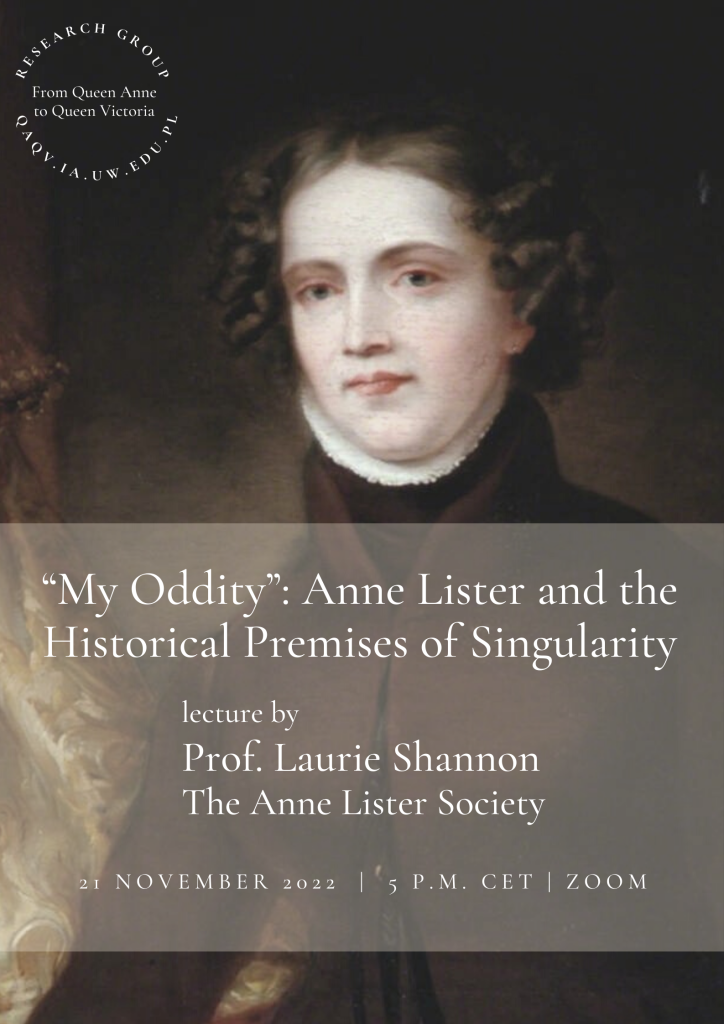
This talk addressed the self-reckonings of Yorkshire diarist and lesbian polymath, Anne Lister (1791-1840). Lister has recently swept onto the global stage as a result of Sally Wainwright’s award-winning series, Gentleman Jack — itself based on the almost 5-million word journals she left behind. While Lister is often glossed as “the first modern lesbian,” that rubric raises as many historical problems as it resolves. This paper asked about the affordances we moderns may have missed by taking Lister’s own preferred explanatory and justificatory term, oddity, as vague, euphemistic, or merely antiquated. Lister’s word choice manifests itself across decades of writing and appears freely across her two scripted “hands” (plain and encrypted). Exploring the intellectual premises of this term in the historical contexts of natural history and theology, we can consider Lister’s self-reckoning as an argument for singularity — for an “identity” with little relation to modern binaries and even without group membership.
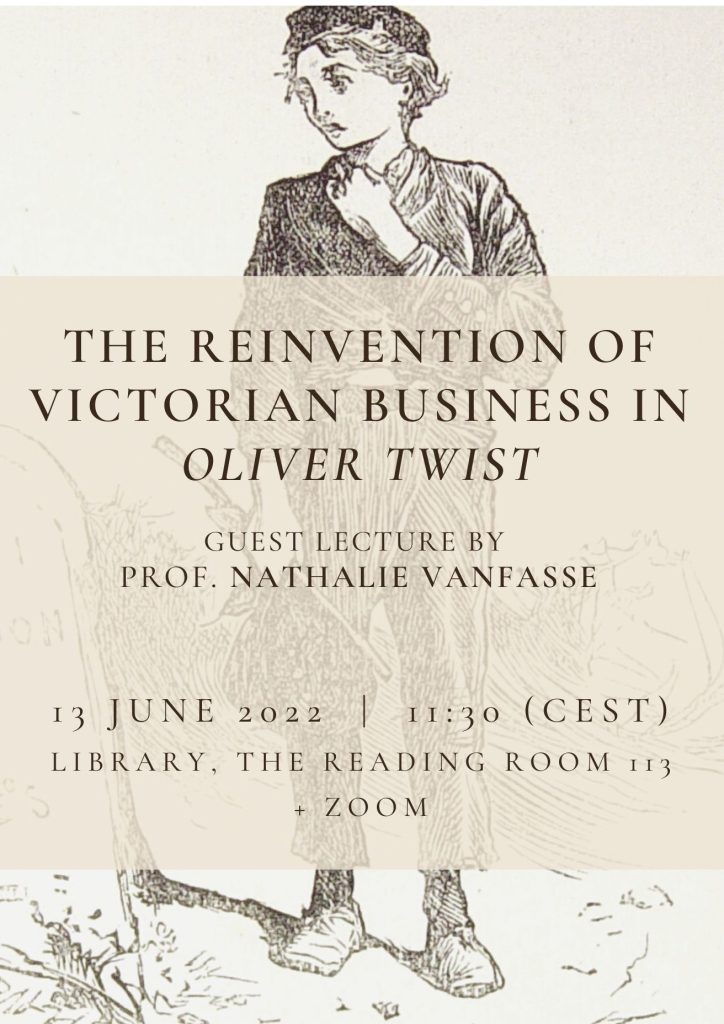
A close reading of the novel Oliver Twist reveals that it revolves around a complex set of rules, forms and business relationships. I will look at how Dickens depicts the different economic structures Oliver becomes involved in successively throughout the novel. I will examine how Dickens uses them to develop both his plot and his thoughts on the very nature of economic relationships, thus transcending his committed and indignant satire of a system he considered perverted and dehumanising. By pointing out the harm Oliver suffers from, as well as the dangers he encounters, the novel undertakes not only to identify their causes, but to outline the possibility of an alternative economy, based on care.
SUGGESTIONS
If you have a suggestion for a guest speaker, let us know: qaqv@uw.edu.pl